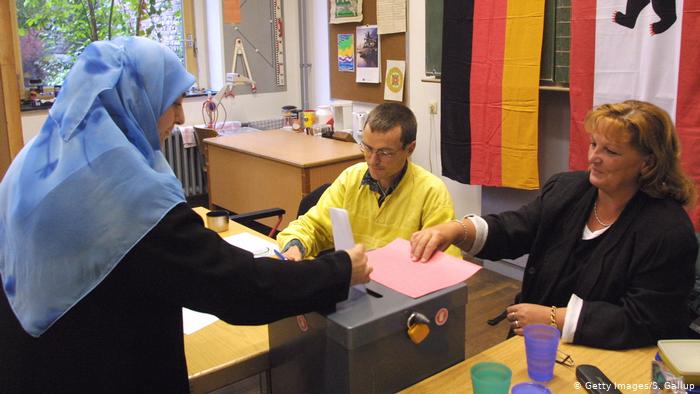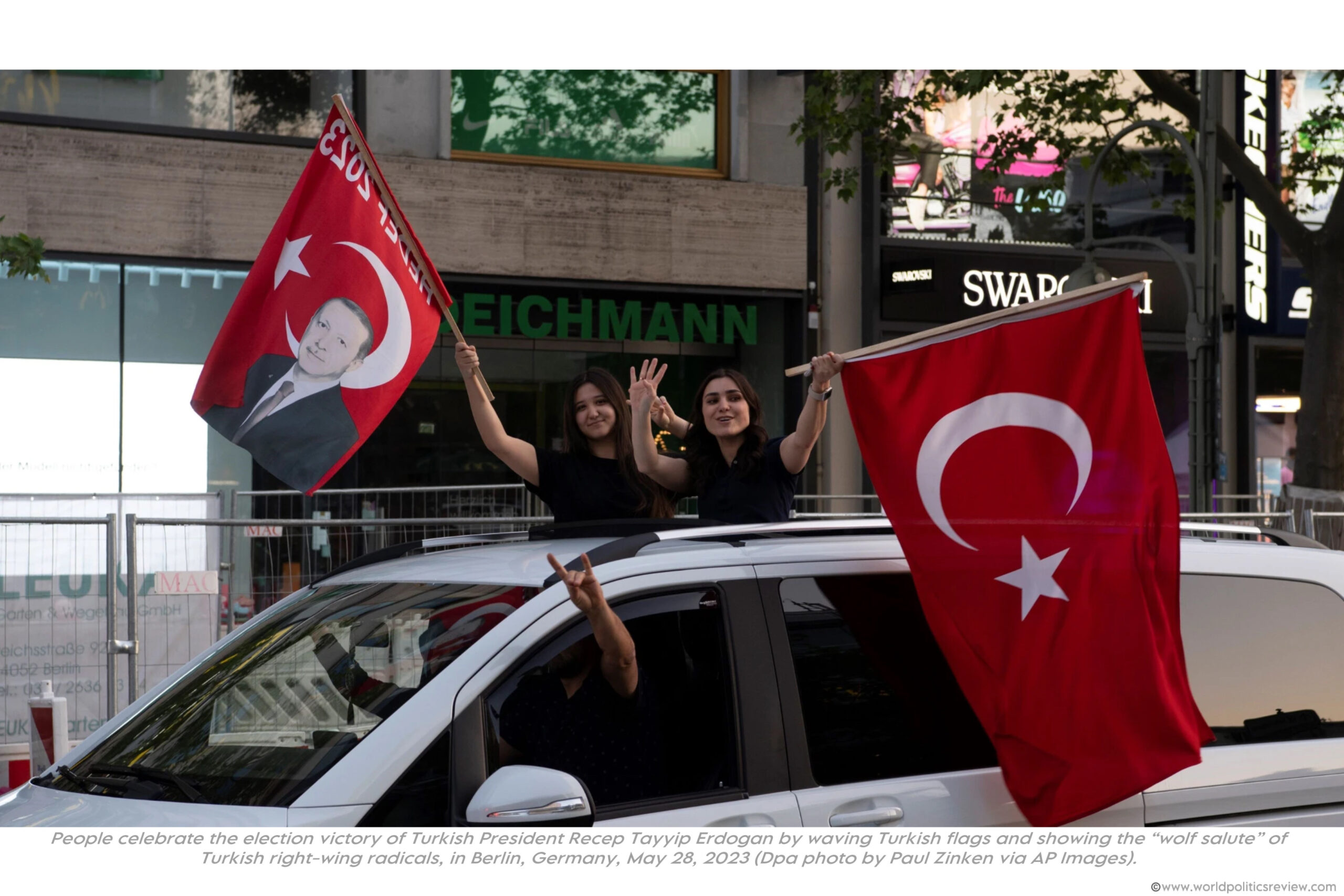Around 5.5 million Muslims live in Germany (Source). Approximately half of these have a German passport and around 1.5 million of these are over the age of 18, making them eligible to vote. Overall, the number of eligible voters with a migrant background has been estimated to be as high as 7.4 million (Source). Not much is known about how this voting bloc – around 12% of the electorate – leans on election day. Demographic breakdowns typically exist only by age, gender, levels of education and occupations. There is an absence of studies laying bare the voting behaviour of Germany’s citizens with an immigrant background at a granular level.

Nevertheless, two significant studies have been carried out in the past by the Konrad Adenauer Foundation that shed some light on variance in political sensitivities and attitudes between Germans with and without an immigrant background. Some data also exists with regards to the largest groups of immigrants – and by extension Muslims – insofar as these correlate with Germany’s Turkish minority, which has been considered at some level of detail alongside immigrants with Russian and Polish backgrounds.
As such, citizens with a Turkish immigrant background were asked in both 2015 and 2019 that if they were faced with elections the coming Sunday, how they might vote. The two instances showcase an inversion of support for the previously ruling grand coalition parties, the conservative Christian Democratic Union (CDU) and the Social Democratic SPD. In 2015, 17% of Turkish immigrants responded that they would vote for the CDU with 50% leaning towards the SPD. In 2019, however, these figures had drastically shifted to a respective 53% and 13% supporting the CDU and SPD, demonstrating an extremely high voter mobility (Source).
Although the shift in support is considerably extreme among Turkish immigrants, the downward trend in support for the SPD can be observed across almost all voting blocs in this period. Support for the SPD by Germans with an immigrant background, taken as a whole, dropped from 32% to 15% between 2015 and 2019. Germans without an immigrant background saw a slightly less dramatic drop in the same period, from 25% to 18% (Source). One of the cause for such a drop in support is often attributed to the unpopular party leader, Andrea Nahles, whose tenure at the helm was cut short in 2019 after just over one year. Conversely, the dramatic jump in support for the CDU is observed only amongst Turkish immigrants. A possible factor is Angela Merkel’s 2015 policy in favor of Syrian refugees.
Further, increased voter mobility is to be taken as a sign of the relevance of topics, incumbent behaviour and the appeal of candidates. The increased mobility of voter blocs, something not exclusive to Turkish immigrants, also helps to avoid reducing voter blocs to guaranteed political affiliations. Social scientist Sabrina Mayer claims: “Party loyalty is declining, decisions are made based on topics and what appeals to individuals is what counts, instead of people just voting as a bloc for a party that has always been associated with their own group” (Source).
With regards to Germany’s smaller parties, there exists significant support among Turkish immigrants for both the far-Left, Die Linke, and the left Greens party. In 2015 and 2019, Die Linke would have earned 16% and 20% of the Turkish immigrant vote, while the Greens would have attracted 16% and 13% of the vote, according to the Konrad Adenauer Foundation study. The free-market liberals, Freie Demokratische Partei (FDP), and the right-wing populist Alternative für Deutschland (AfD) both moved from 1% to 0% between 2015 and 2019 (Source).
Findings beyond political affiliation from the same study highlighted that foreigners are most satisfied with democracy in Germany. When comparing the rate at which Germans with and without an immigrant background as well as foreigners polled when answering that they were either very or somewhat satisfied with German democracy, these three groups responded favourably at rates of 50%, 58%, and 65%, respectively. The study further found that in the evaluation of fundamental democratic rights and values, there are hardly any differences between Germans, Germans with a migration background and foreigners living in Germany. However, among foreigners and Muslims the positive attitude towards freedom and freedom of opinion was shown to quickly come up against its limits when it comes to the position of one’s own faith when faced with insults. As such, while a total of just 19% of all respondents (15% of Evangelicals and 19% of Catholics) claimed very assertively in their answers that the state should better protect one’s own faith from insult, this figure jumps to 40% among foreigners and up to 60% for respondents of Muslim faith (Source).

Irrespective of attitudes and proclivities, what is noticeable about the Muslim voter bloc, in particular, is the below average voter participation. German voter participation has traditionally been very high when it comes to national elections. The 1970s and early 1980s saw the figure for voter participation hover around 90% (Source). A historic low of 70.8% was reached in 2009 before the figure rose again to almost 77% to mark this year’s turnout. However, the turnout for Muslims is considered to be significantly below this mark. Although not quantified specifically for Muslims, the number is considered to be 20% below the national average for voters with a migrant background (Source). Social activist Naima Niazy states: “There is a study from 2017 that shows that people who have a migration background and live in Germany in the second generation have both a stronger party preference and also participate more in other political things like demonstrations, signature collections than is the case with people without a migration background. But they still vote less often” (Source).
Two key reasons have been identified to explain the phenomenon. On the one hand, there is the familiarity with the act of voting, akin to a tradition. As Niazy explains: “If you grow up with your parents taking you to the polls and going out for ice cream afterwards, and you grow up with that, then that will also have an influence” (Source). On the other hand, there is also the crucial matter of identifying with party members and their appeal to voters.
With regards to representation in Germany’s parliament, or Bundestag, 58 of the last parliament’s 709 members had non-German roots. However, this number is up from 37 out of 631 from the previous Bundestag. With the number of members of parliament following on from the September elections set to rise to 735, this offers the potential for the share of members with non-German roots to rise further. The number of Muslims in the German parliament following the September election now lies at 8, or 1.1% of representatives. When making up 6.6% of the population, this has been cited as “considerable underrepresentation” – even by the Catholic Church’s official internet portal, Katholisch.de (Source).
Highlighting the Muslim sentiment, Bekir Altas, the general secretary of the Islamic association Millî Görüş (IGMG) states that: “The Muslim population in Germany does not feel represented by politics. This is the main reason for their low voter turnout. Politics has an obligation here” (Source). Echoing this sentiment further is social activist Ali Can: “We have failed to give people with a migration background the feeling that they too belong in Germany” (Source).






